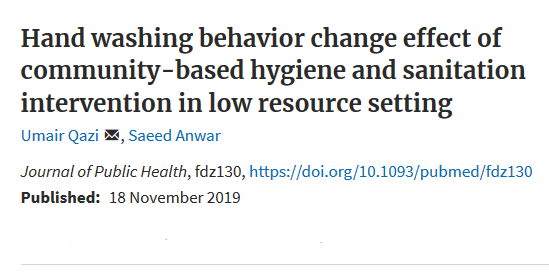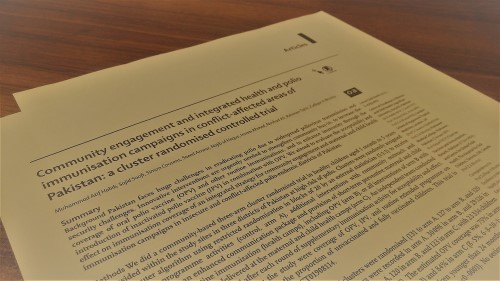Study titled "Community engagement and integrated health and polio immunization campaigns in conflict-affected areas of Pakistan: a cluster randomized controlled trial" that involved Dr. Saeed Anwar and Dr. Najibul Haq as co-investigators from Peshawar Medical College has published in Lancet - Global Health.
The research conducted by health experts from the Aga Khan University in partnership with the Peshawar Medical College, the London School of Hygiene and Tropical Medicine and Canada’s Centre for Global Child Health at the Hospital for Sick Children, Toronto, tested a range of interventions in 387 insecure areas of the country in Bajaur, Karachi and Kashmore where children are especially vulnerable to contracting polio: a disease that has been eradicated in all countries except for Pakistan, Afghanistan and Nigeria.
Prof. Najibul Haq, Dean, Peshawar Medical College, a co-investigator in the study as lead of the implementation for Bajaur Agency component shared that the research was implemented at a time when Bajaur was hot spot of militancy and war on terror. Curfews were a routine in the area every now and then. Commitment of the civil and military administration, the then DHS FATA, the then Agency Surgeon, line departments and top of all the grass root level project team of locals were instrumental in overcoming all those serious threats and challenges. He lauded efforts of all the stake holders and also of the core team members from Peshawar Medical College especially Dr. Zahoorullah, Dr. Muhammad Sharif and Dr. Saeed Anwar for coordinating the operations and assisting quality assured implementation and monitoring of the project.
"Eradication of polio is a national and global imperative, we worked closely with the World Health Organization, UNICEF, the Bill and Melinda Gates Foundation, as well as federal and provincial governments ..." said the senior author of the study Professor Zulfiqar A. Bhutta, founding director of AKU’s Centre of Excellence in Women and Child Health and the Chair in Global Child Health at the Centre for Global Child Health in Toronto.
The study was funded by the Bill and Melinda Gates Foundation and was completed over a period of four years of planning and execution.
Study is available at the following link:












